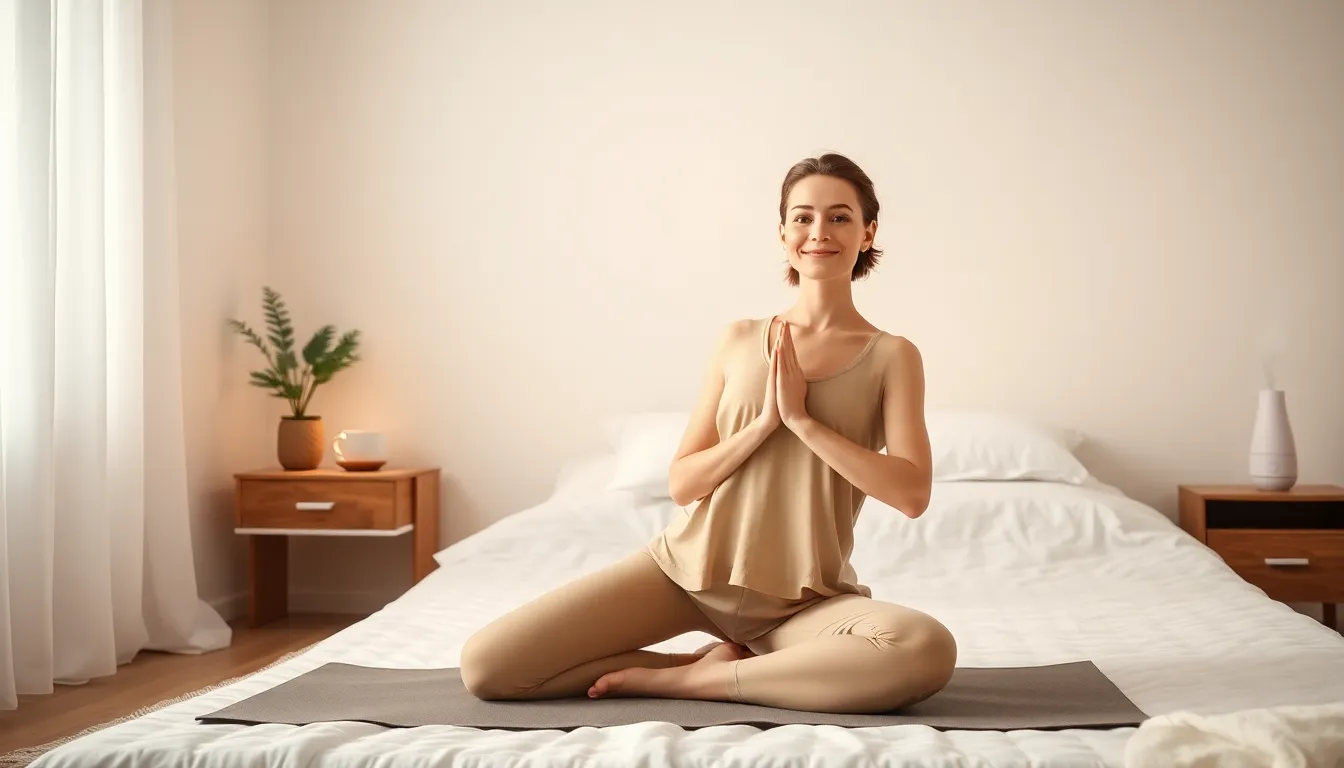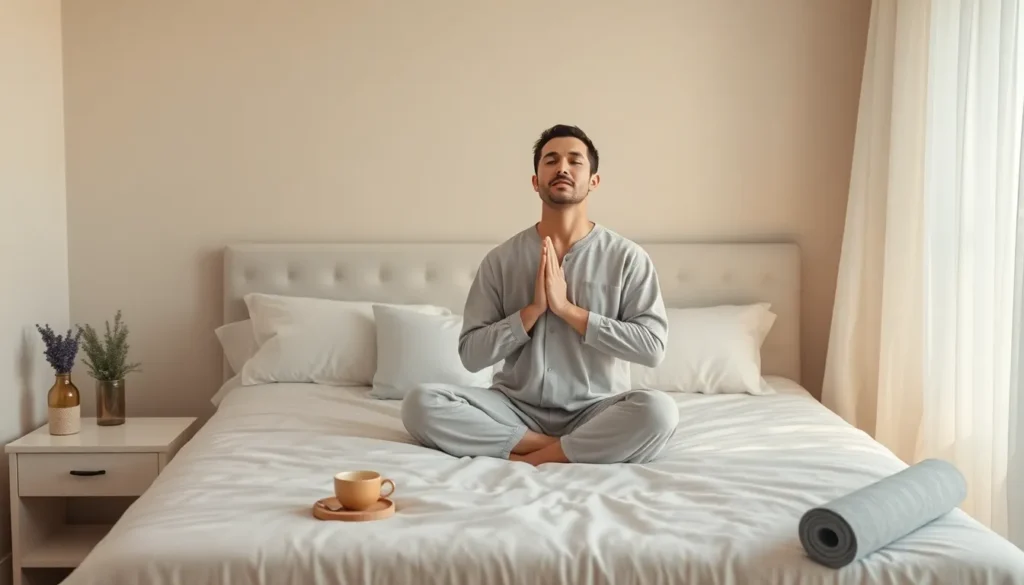In a world where counting sheep has become a nightly chore, it’s time to rethink how we approach sleep. Holistic sleep methods offer a refreshing twist, blending ancient wisdom with modern science to help restless souls find their way to dreamland. Imagine drifting off not just with a goodnight kiss but with a soothing cup of herbal tea and a sprinkle of mindfulness.
Table of Contents
ToggleUnderstanding Holistic Sleep Methods
Holistic sleep methods emphasize a comprehensive approach to achieving restful sleep. These methods integrate various practices that nurture both body and mind. Mindfulness plays a crucial role; practitioners use techniques like breathing exercises and guided imagery. Herbal teas, including chamomile and valerian root, promote relaxation and signal the body to prepare for sleep.
Alternative therapies, such as aromatherapy, utilize essential oils like lavender or bergamot to create a calming environment. Incorporating yoga into a bedtime routine helps reduce tension in muscles and calms the nervous system.
Environmental factors can significantly impact sleep quality. Ensuring a dark, quiet, and cool bedroom enhances the likelihood of falling asleep faster. Limiting screen time before bed aligns with holistic principles by reducing blue light exposure, which can disrupt the body’s natural circadian rhythm.
Adjusting lifestyle habits also contributes to improved sleep. Regular physical activity, even light exercise, positively influences sleep patterns. Additionally, maintaining a consistent sleep schedule trains the body’s internal clock, resulting in better sleep quality.
Finally, engaging in relaxing activities, like reading or journaling, provides a transition from daytime stress to restful sleep. Exploring these holistic sleep methods can lead to significant improvements in overall well-being and sleep quality.
Benefits of Holistic Sleep Methods

Holistic sleep methods provide numerous advantages for individuals seeking improved rest. These approaches blend ancient techniques and modern knowledge to enhance overall sleep quality.
Improved Sleep Quality
Enhanced sleep quality emerges from a combination of various holistic practices. Mindfulness techniques like breathing exercises promote relaxation, allowing individuals to fall asleep faster. Engaging in calming rituals, such as sipping chamomile tea, also aids in creating a tranquil bedtime atmosphere. Furthermore, maintaining a dark and cool bedroom significantly contributes to uninterrupted sleep cycles. Regular yoga before bedtime stretches muscles and induces a sense of calm. Prioritizing these strategies can result in deeper, more restorative sleep.
Reduced Stress and Anxiety
Holistic sleep methods effectively reduce stress and anxiety. Aromatherapy using calming essential oils, such as lavender, creates a soothing environment that helps ease tension. Practicing guided imagery allows individuals to visualize peaceful scenarios, enhancing relaxation before sleep. Additionally, consistent bedtime routines signal the body to unwind, making it easier to let go of daily worries. Incorporating regular physical activity during the day further alleviates stress levels. These practices create a comprehensive approach to calming the mind and body, leading to a more restful night.
Common Holistic Sleep Techniques
Holistic sleep techniques focus on nurturing both body and mind, enhancing sleep quality effectively. Various methods promote relaxation, reduce stress, and create a calming environment conducive to restful sleep.
Aromatherapy
Aromatherapy uses essential oils to foster relaxation and improve sleep. Lavender oil consistently emerges as a favorite for its soothing properties, scientifically shown to lower heart rate and reduce anxiety. Chamomile oil can also promote a sense of peace, aiding in quicker sleep onset. Incorporating these scents into a bedtime routine, whether through diffusers or pillows, creates a serene atmosphere. Some research suggests that inhaling these fragrances can enhance sleep duration and quality noticeably.
Meditation and Mindfulness
Meditation and mindfulness techniques cultivate a state of calm, enhancing sleep quality. Practicing deep breathing exercises helps clear the mind, allowing for greater focus on relaxation. Guided imagery encourages visualization of peaceful settings, effectively reducing stress and anxiety before sleep. Engaging in mindful movements, such as gentle yoga, prepares the body for rest. Studies indicate that those who practice these methods regularly report better sleep outcomes and increased overall well-being.
Nutritional Approaches
Nutritional approaches significantly impact sleep quality, emphasizing the importance of balanced diets. Consuming magnesium-rich foods, like almonds and spinach, supports muscle relaxation, promoting better sleep. Herbal teas, particularly chamomile and valerian root, not only soothe but also enhance overall sleep. Keeping a consistent meal schedule also aligns digestion with circadian rhythms, facilitating natural sleep onset. Research indicates a direct correlation between dietary choices and sleep quality, reinforcing the need for mindful eating habits.
Integrating Holistic Sleep Methods into Daily Life
Holistic sleep methods can seamlessly fit into daily routines, enhancing overall sleep quality. By prioritizing specific practices, individuals can cultivate better rest.
Creating a Sleep-Conducive Environment
A calming atmosphere significantly impacts sleep quality. Darkness in the bedroom promotes the production of melatonin, aiding the body’s natural sleep cycle. Quiet surroundings reduce disturbances, allowing for uninterrupted rest. Lowering room temperature creates a comfortable environment that supports sleep. Each element, from using blackout curtains to minimizing noise with earplugs, contributes to creating a serene space. Plants can also enhance air quality, fostering relaxation. Personalizing the bedroom with soothing colors and minimal clutter can further cultivate a peaceful setting.
Establishing a Bedtime Routine
Consistency is crucial for establishing a successful bedtime routine. Engaging in calming activities signals the body that it’s time to wind down. Incorporating practices such as reading or gentle stretching can help transition to sleep. Limiting blue light exposure by turning off screens an hour before bed prepares the mind for rest. Herbal tea, especially varieties like chamomile, offers a soothing option for relaxation. Including mindfulness exercises before sleep can also ease stress and promote tranquility. This intentional routine aligns body rhythms, reinforcing the connection between daily practices and improved sleep quality.
Embracing holistic sleep methods can transform the way individuals experience rest. By integrating calming rituals and mindfulness practices into daily routines, they can foster a more restful environment that nurtures both body and mind.
The combination of herbal teas, aromatherapy, and mindful exercises creates a soothing atmosphere conducive to sleep. Additionally, making small adjustments to the sleep environment can significantly enhance sleep quality.
Incorporating these techniques not only improves sleep but also promotes overall well-being. By prioritizing holistic approaches, individuals can unlock the potential for deeper and more restorative sleep, leading to a healthier lifestyle.




